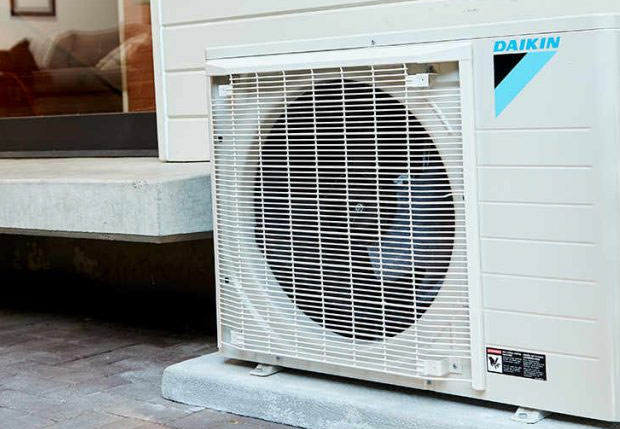Benefits of a Heat Pump for Your Home’s Heating & Cooling
Both indoor comfort and energy economy are important. One of the largest energy consumers and contributors to high energy costs is your home’s HVAC system. A heat pump system is a reliable and efficient technique to maintain controlled humidity and temperature. Your heat pump will run as efficiently and effectively when paired with a modulating furnace.
Because Fante’s Home Services HVAC specialists are qualified to repair all brands and models of heating and cooling systems, we have the knowledge to assist you in determining whether a heat pump is the best option for your needs. Call Fante’s at 1-609-445-2939 to learn more about the advantages of a heat pump system or schedule an appointment.

How Heat Pump Systems Operate
Heat pumps are becoming more and more popular throughout the region since they work effectively in weather that is continuously changing. They cool as successfully as a modern air conditioner, but the main advantages come in the winter. Compared to a conventional furnace, a heat pump will result in energy savings.
Heat pumps pull heat from the ground or outdoor air during the winter and move it indoors to circulate via your ductwork. You save a lot of energy because it isn’t producing the heat on its own. Extreme cold will be easier to handle if you combine a heat pump with a modulating furnace that runs regularly at a low speed. This procedure is virtually reversed in the summer. The temperature inside naturally decreases as heat is naturally extracted from indoor air and sent outside.
Instead of installing both a heating system and a cooling system in your home, this method of collecting heat from the air enables the use of a single system to maintain a comfortable indoor temperature. In addition to the initial cost savings of a single unit purchase, only one system will need maintenance and repairs.
Contact Us Today by filling out the form below, or calling us at 1-609-445-2939
Quick Contact
"*" indicates required fields
Types of Heat Pump Systems
There are 3 heat pumps commonly used that are often installed to heat and cool homes and businesses throughout the area. They each rely on a different heat source to provide the necessary energy to regulate indoor temperatures.
Air Source Heat Pump
An air source heat pump is the most often used type of heat pump. It is the least priced choice and has essentially the same footprint as a central air conditioner. Depending on the season, the system extracts heat energy from the air inside or outside and uses it to control the temperature within your home. Compared to a typical split heating and cooling system, they are more efficient.
Ground Source Heat Pump
Ground-source heat pumps, also referred to as geothermal heat pumps, obtain their heat energy from the constant earth temperature. This kind of heat pump system comes in a few different forms, but it typically consists of a loop of subterranean piping that draws heat from the earth. Although they are highly effective systems, installing them takes a lot of work.
Water Source Heat Pump
Compared to other geothermal heat pump systems, the water-source heat pump is frequently simpler to install. However, you must have a lake, pond, or other sizable body of water on your land. Water effectively maintains heat, making it a useful source of thermal energy that may be used to generate heating and cooling for buildings.
How Does a Modulating Furnace Work?
Single-stage systems are the norm for home and modest commercial furnaces. This means that they are either on or off. A typical furnace uses a lot of energy when it is creating heat. Variable speed functioning of a modulating furnace enables more constant temperature control, less energy use, and more effective operation. Your variable speed, modulating furnace will effectively operate continually while operating at a very low speed to maintain constant indoor temperatures and prevent hot and cold waves. Similar to inverter air conditioners, these systems essentially perform the same functions with cooling. High energy bills are a thing of the past when used in conjunction with a heat pump.
Enhanced Humidity Control
A heat pump automatically dehumidifies the air in the summer because it absorbs heat energy from the air. A “dry mode” setting is available on many newer heat pumps, which actively reduces humidity by switching between heating and cooling modes in order to remove moisture from the air while maintaining your home’s temperature. You will feel cooler as a result, even in hotter weather.

Heat Pump System Maintenance
Regular maintenance is essential to extending the life of your HVAC devices, regardless of the type of system you have. This is particularly true with a heat pump system because it handles both the heating and cooling responsibilities. Your heat pump could leave you without enough temperature control at the worst possible time if any component isn’t working properly. For HVAC maintenance, Fante’s provides a Front-of-the-Line Family Plan that includes 2 precise tune-ups annually, discounted heat pump repair services, and more.
Maintenance Checklist
- Refrigerant Levels
- Evaporator Air Filter
- Ductwork
- Thermostat Functionality
- Electric Controls
- Compressor and Condenser
Convenient Heat Pump System Financing is Available
Convenient financing alternatives are available from Fante’s to lessen the financial burden of installing a new heat pump. Your indoor comfort shouldn’t have to be put on hold due to the high initial cost of replacing your HVAC system. Don’t be hesitant to get in touch with us immediately for a free quote on a new energy-efficient heat pump because it will end up saving you money over its lifetime.
Choose Fante’s for all Your Expert Heating & Air Conditioning Services
For years, we have provided dependable heating and cooling services to property owners all around the area. You can ask any questions you may have about installing a new heat pump system to our qualified HVAC professionals. In order to help you choose the HVAC system that best suits your needs, we will be happy to go over all the advantages and disadvantages of each type. Call us at 1-609-445-2939 to set up a free estimate and get started.

